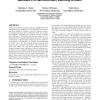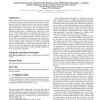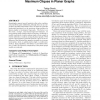GECCO
2006
Springer
13 years 8 months ago
2006
Springer
In this paper, it is presented a new way to characterize the phenotype in the context of Genetic Algorithms through the use of Game Theory as a theoretical foundation to define a ...
GECCO
2006
Springer
13 years 8 months ago
2006
Springer
Both genetic algorithms (GAs) and temporal difference (TD) methods have proven effective at solving reinforcement learning (RL) problems. However, since few rigorous empirical com...
GECCO
2006
Springer
13 years 8 months ago
2006
Springer
In this paper, we propose the island model parallel memetic algorithm with diversity-based dynamic adaptive strategy (PMADLS) for controlling the local search frequency and demons...
GECCO
2006
Springer
13 years 8 months ago
2006
Springer
We use probabilistic boolean networks to simulate the pathogenesis of Dengue Hemorraghic Fever (DHF). Based on Chaturvedi's work, the strength of cytokine influences are mode...
GECCO
2006
Springer
13 years 8 months ago
2006
Springer
This paper compares the performance of the program evaluation phase of genetic programming using C and Common Lisp. A simple experiment is conducted, and the conclusion is that ge...
GECCO
2006
Springer
13 years 8 months ago
2006
Springer
Particle Swarm Optimization (PSO) is a population-based optimization method in which search points employ a cooperative strategy to move toward one another. In this paper we show ...
GECCO
2006
Springer
13 years 8 months ago
2006
Springer
Memetic algorithms are evolutionary algorithms incorporating local search to increase exploitation. This hybridization has been fruitful in countless applications. However, theory...
GECCO
2006
Springer
13 years 8 months ago
2006
Springer
Trading rules are widely used by practitioners as an effective means to mechanize aspects of their reasoning about stock price trends. However, due to the simplicity of these rule...
GECCO
2006
Springer
13 years 8 months ago
2006
Springer
Surprisingly, general search heuristics often solve combinatorial problems quite sufficiently, although they do not outperform specialized algorithms. Here, the behavior of simple...
GECCO
2006
Springer
13 years 8 months ago
2006
Springer
This paper presents an evolutionary algorithm to develop cooperative strategies for power buyers in a deregulated electrical power market. Cooperative strategies are evolved throu...




